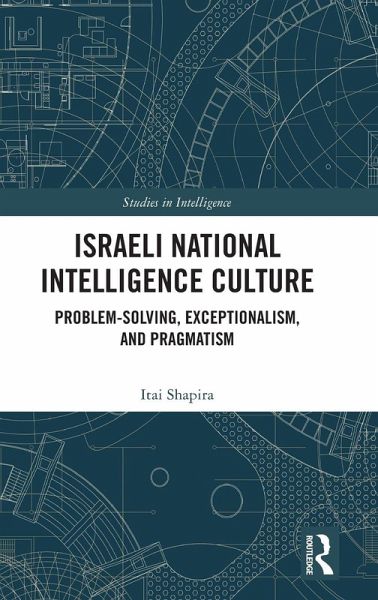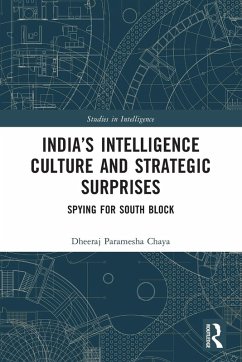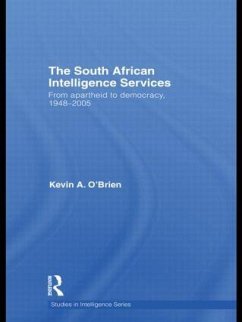
Israeli National Intelligence Culture
Problem-Solving, Exceptionalism, and Pragmatism
Versandkostenfrei!
Versandfertig in 6-10 Tagen
160,99 €
inkl. MwSt.
Weitere Ausgaben:

PAYBACK Punkte
80 °P sammeln!
The book offers a novel conceptualization of Israeli national intelligence culture, describing the way in which Israelis perceive and practice intelligence.Different nations have different national intelligence cultures, relying on different ideas of intelligence, perceiving and practicing intelligence in different ways. Written by a former senior intelligence officer, this book is the first study dedicated to Israeli intelligence culture and the way it reflects Israeli strategic culture. Relying on more than 30 elite interviews with acting and former Israeli practitioners, the book highlights...
The book offers a novel conceptualization of Israeli national intelligence culture, describing the way in which Israelis perceive and practice intelligence.
Different nations have different national intelligence cultures, relying on different ideas of intelligence, perceiving and practicing intelligence in different ways. Written by a former senior intelligence officer, this book is the first study dedicated to Israeli intelligence culture and the way it reflects Israeli strategic culture. Relying on more than 30 elite interviews with acting and former Israeli practitioners, the book highlights the Israeli aversion to intelligence theory and scientific methods, as well as to the structured management of the intelligence system at the national level. It describes the intelligence system's emphasis on contrarian thinking and moral courage as the foundations of intelligence professionalism, and the growing inclination of Israeli intelligence toward action and influence. Intelligence is perceived and practiced by Israelis as a tool for problem-solving, addressing unique Israeli challenges. While some traits of the Israeli national intelligence culture have contributed to its high reputation and its 'success story', others might have also contributed to its failure in anticipating the Hamas terrorist attack on October 2023 or have remained aspirational norms rather than realized practice. The October 2023 failure, as that of the Yom Kippur War in 1973, will undoubtfully influence Israeli national intelligence culture for many years to come.
This book will be of much interest to students of intelligence studies, Israeli politics, strategic studies, and international relations.
Different nations have different national intelligence cultures, relying on different ideas of intelligence, perceiving and practicing intelligence in different ways. Written by a former senior intelligence officer, this book is the first study dedicated to Israeli intelligence culture and the way it reflects Israeli strategic culture. Relying on more than 30 elite interviews with acting and former Israeli practitioners, the book highlights the Israeli aversion to intelligence theory and scientific methods, as well as to the structured management of the intelligence system at the national level. It describes the intelligence system's emphasis on contrarian thinking and moral courage as the foundations of intelligence professionalism, and the growing inclination of Israeli intelligence toward action and influence. Intelligence is perceived and practiced by Israelis as a tool for problem-solving, addressing unique Israeli challenges. While some traits of the Israeli national intelligence culture have contributed to its high reputation and its 'success story', others might have also contributed to its failure in anticipating the Hamas terrorist attack on October 2023 or have remained aspirational norms rather than realized practice. The October 2023 failure, as that of the Yom Kippur War in 1973, will undoubtfully influence Israeli national intelligence culture for many years to come.
This book will be of much interest to students of intelligence studies, Israeli politics, strategic studies, and international relations.














